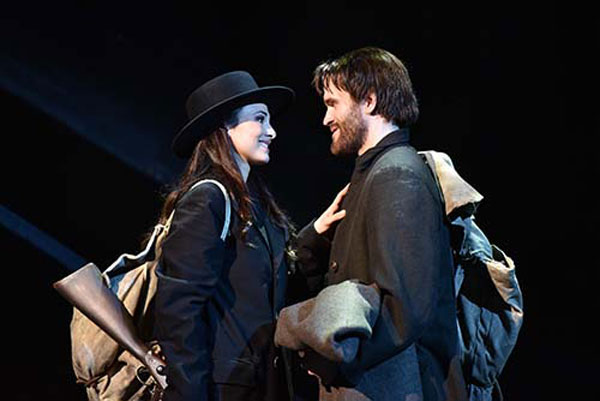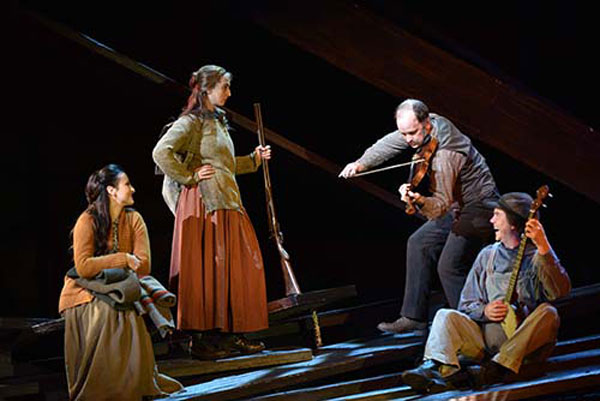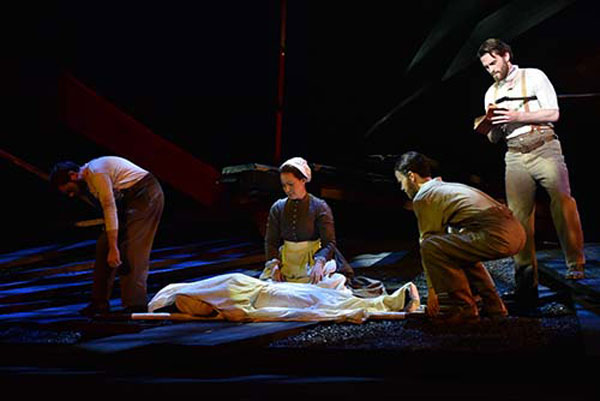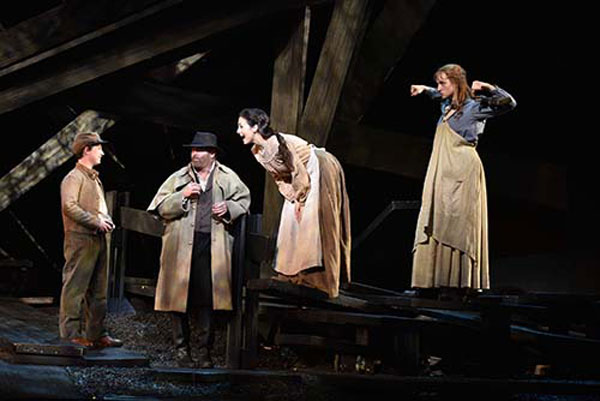|
February 7, 2016, for most Americans will be remembered as Super Bowl 50, but the Philadelphia Opera at the Academy of Music will mark this
day as a turning point for new opera. For the matinee performance of Cold Mountain by Pulitzer Prize-winning composer Jennifer Higdon and prolific librettist Gene Scheer, the house was 90 percent full (the Academy holds just over 2500), over 500 people attended the pre-show lecture, and 300 attended the Q & A after the performance.
The opera, based on Charles Frazier’s National Book Award-winning novel by the same title, unfolds the life-and-death struggle of a
wounded American Civil War soldier who deserts the Confederate Army to find the woman he loves. Neither W.P. Inman ((baritone Jarrett Ott) nor Ada Monroe (mezzo-soprano Isabel
Leonard) are the same people who fell in love.

He has seen and exacted countless atrocities and he is hunted by a brutal military enforcer known as Teague (tenor Jay Hunter
Morris) who heads up the Home Guard. Ada, a well-educated woman who led a life of privilege prior to the Civil War, has lost
her father but owns property on Cold Mountain. However, she lacked practical knowledge for how to survive until she partnered with a mountain woman named Ruby Thewes (mezzo
-soprano Cecelia Hall). Ruby teaches Ada to plant, plow, harvest and to shoot a gun and stand her ground. As for the story and how it is told, Cold Mountain has something for every audience
member—the history buff, adventurer, feminist, poet, dreamer.

The music is lyrical and easy to hear for audience not familiar with the trends of new classical music. While it does not have
memorable, singable arias, it does have rich choral music and vocal ensembles. Higdon also uses invented blue grass and folk
tunes to capture the aural landscape of North Carolina. What makes musical moments standout are Gene Scheer’s words. For
example, in Act I, scene 2, the chorus sings, “What was his name?...When will this end? What waits for me now? Oh, to be home
and safe—Beyond reveille’s reach.” This scene sets up Inman who is at a Confederate hospital watching the burial of another
comrade. He tells a blind man (bass baritone Kevin Burdette), “I believe a man’s spirit can be blasted away. I’m a hut of bones.”
Inman guesses the blind man must feel this too and Inman asks what the man would pay to see even for ten minutes. The blind
answers he would “not give a cent” fearing what he saw might make him hateful.

Beautiful folk tunes are assigned to two hateful characters. The audience first hears Inman’s nemesis Teague as Act I, Scene 1
opens. He sings off stage, “Peaches in the summertime, apples in the Fall, if I can’t have that girl, I don’t want none at all.” It is a
song one would think Inman would sing. Teague continues on stage with, “I wish I had a banjo string, made of gold and twine,
and every tune I’d play on it, I’d wish that girl was mine.” Teague’s melodic entry is disarming but not to an old man
named Owens (baritone Marcus DeLoach) who grabs his gun to load it. Teague is hunting Owens’ son and suspects the son is in
hiding and was moments ago helping his father dig out a tree stump. Owens points his rifle at Teague and Teague’s men
appear with their rifles aimed at Owens. Teague gives his signal and his men move on the old man, stabbing and throwing him
into the hole left by the stump. Then they shovel dirt over him. The son rushes from his hiding place to protect his father to no
avail. He is captured and hauled away, leaving the father to either dig himself out or die. Unlike Jean Valjean’s foe Javert in Les Misérables, there is nothing redeeming about Teague except
his ability to sing a beautiful folk tune.

In Scene 9 of Act I, Ruby discovers her good-for-nothing father caught in one of her animal traps. Ruby wants Stobrod (also
sung by Kevin Burdette) gone but Teague shows up, singing as usual. After Teague leaves, escorted to the edge of Ada’s
property by Ada, Stobrod thanks Ruby for hiding him and says he has changed from being a sorely neglectful father who drank
and left her as a young child on her own without food or protection. He also says he is going to write a song for his
daughter. In Scene 3 of Act II at a camp for deserters, Stobrod sings the song promised, “Bless you, Ruby…the world goes
‘round…what’s lost is found…the garden is wrapped in ice, but I still smell the rose.” The song touches Ada but not Ruby. The
two came to the camp to bring food and winter coats that belonged to Ada’s father. Stobrod also sings another song he
wrote for a dying girl who had requested a fiddler to ease her transition to the other side. When his standard repertoire did
not please the girl, he improvised this haunting song: “If I knew why, I’d tell you…But there are some things that no one
knows…So all I can do is sing to you…”
The story of Inman traveling home to Cold Mountain, Teague chasing him and other deserters, and the partnership of Ada and
Ruby often play simultaneously on the stage. This is how Higdon achieves “real time” duets between the separated lovers
although there are flashbacks to their courtship before the War began, a war Inman thought would last only six months. Some of
Inman’s experiences come across like those of Odysseus but a favorite scene of this reviewer—Lila (soprano Heather Stebbins)
and her three sisters—is more like the German folktale of the siren Lorelei which Wagner interpreted as the Rhinemaidens and who appear in parts of the Der Ring des Nibelungen.
Robert Brill’s set, as stated during the question and answer period after the performance, is “an art installation to show the
splintering of the South.” Part of the set moves to become an abstract boat that capsizes as Inman is trying to escape Teague
and the Home Guard. He and his ferryman, an adulterous minister who earlier Inman stopped from killing his pregnant
lover, wash up on the banks where Lila and her sisters are either swimming or washing clothes. The young women cluster around
Inman and each want him, including Lila who is married. Of her husband, Lila says, “he isn’t a man, he’s a husband.”
Corrado Rovaris ably conducts a large orchestra where brass and percussion have prominent parts. Likewise, director Leonard
Foglia has a large cast of singers and actors (there are three spoken voice parts). Some of the singers double, but these are
minor roles except for Kevin Burdette who is both the blind man and Stobrod. This reviewer thinks the cast, which is made up of
experienced and new performers, does an outstanding job though no one performer out shines any other.
Cold Mountain was co-commissioned and co-produced by The Santa Fe Opera (where the work had its world premiere
August 1, 2015 with six sold-out performances), Opera Philadelphia (presenting the East Coast premiere in five performances), and Minnesota Opera (2018-2019 season) and in
collaboration with North Carolina Opera (2017-2018 season).
During the Q & A, this reviewer asked Jennifer Higdon, a first-time opera composer, to compare the Santa Fe production to
Opera Philadelphia’s. She said she preferred the intimacy of the Philadelphia Academy of Music production as opposed to the
outdoor setting of Santa Fe. She was also very appreciative of Opera Philadelphia’s orchestra. Standing with librettist Gene
Scheer, novelist Charles Frasier, and conductor Corrado Rovaris, Higdon said, “writing opera rewired my brain.” She also said she constructed the Cold Mountain music as if it were a fence and
pitched the colors of her orchestration based on whether the subject was metallic, wood, dirt, or emotion. Scheer spilled some
of his writing secrets saying that in each scene, a character has to make a choice “it’s that to-be-or-not-to-be situation.” He also
said that he needed first to understand the movement of the characters as if he were working on a silent film. Frasier said Cold Mountain was his first novel (it won the United States
National Book Award for Fiction in 1997) and he was not going to allow just anyone to turn his story into an opera, an art form that
he never experienced until he saw the Higdon-Scheer creation put on stage.
Cold Mountain is an outstanding collaboration of artists who excel at what they do and a memorable example of new
American opera. Opera Philadelphia has a lot to celebrate.
Photos - Courtesy Philadephia Opera
|